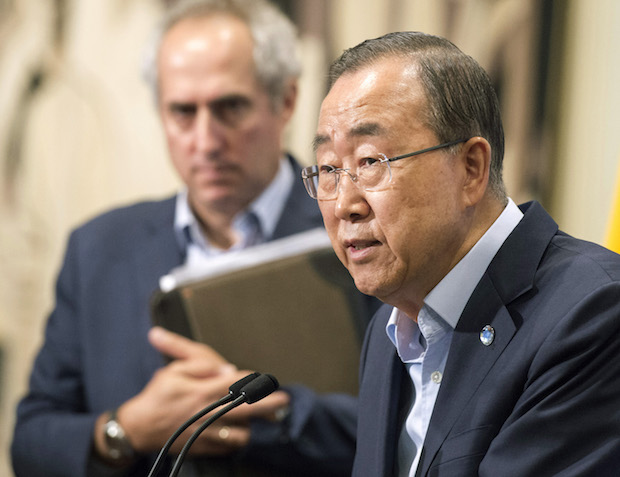
In this Aug. 12, 2015 file photo provided by the United Nations, UN Secretary General Ban Ki-moon addresses the media outside the Security Council chambers at UN headquarters, where he announced the firing of the head of the UN peacekeeping mission in the Central African Republic. Babacar Gaye, of Senegal, was terminated over the force’s handling of dozens of sexual and other misconduct allegations, including rape and killing, in the year and a half of its existence. Stretched for resources with a record number of peacekeepers in the field, the UN has hesitated to upset member states by announcing the countries whose troops or police are accused of wrongdoing, until now. Last week, Ban announced his intention to do so. AP FILE PHOTO
UNITED NATIONS — The United Nations is rejecting growing pressure to name countries whose peacekeepers face sexual abuse accusations in Central African Republic against children as young as 11, keeping silent because member states have delayed the UN chief’s plan to identify alleged perpetrators.
The UN General Assembly in June adopted a resolution that in part singled out Secretary-General Ban Ki-moon’s intention to name countries when sexual abuse allegations are credible. The resolution asked Ban to “engage in consultations with member states, in particular troop-contributing countries” over reporting such cases.
Peacekeepers in Central African Republic have been hit by more than a dozen allegations of sexual abuse, and Ban last week took the unprecedented step of firing the mission’s leader, saying “enough is enough.” The issue has haunted the world body for years.
Ban also repeated his intention to start naming countries. But a spokeswoman for him this week said the initiative needs the 193-member General Assembly’s approval.
Of the 13 sexual abuse allegations received since peacekeepers started arriving in Central African Republic nearly a year ago to calm sectarian violence, “nine involve alleged attacks on minors,” the mission’s deputy head, Diane Corner, said Thursday.
No one has been convicted, she said.
The latest accusations, announced Wednesday, were brought by the families of three young females, including one minor, against three members of Congo’s military. Half of that country’s troops, and all of its police officers, are now expected to leave the mission by October instead of December.
The UN has been urged to name names. In June, a high-level panel led by Nobel Peace Prize laureate Jose Ramos-Horta recommended a major overhaul of peacekeeping operations that would include naming countries whose troops commit acts of sexual abuse.
Countries have the sole responsibility to prosecute their troops, but the U.’s internal oversight office this summer reported that many countries don’t even tell the UN whether they intend to investigate alleged sexual misconduct.
The UN relies on member states to contribute troops and police to put peacekeepers in some of the world’s most vulnerable areas. Most of the top troop contributors are largely developing countries from Africa and South Asia, who are paid a little over $1,000 per person per month in return.
Angering the countries by naming them in sexual misconduct cases could shrink an already stretched pool of available troops and police.
Congo’s military, which has nearly 900 personnel in Central African Republic, has been called out by the UN in the past for conflict-related sexual violence, including against children.
Dragica Mikavica, advocacy officer for the New York-based Watchlist on Children and Armed Conflict, told The Associated Press that when the group asked why Congo was allowed to send peacekeepers when it serves in no other UN mission, the peacekeeping office replied, “They have the troops.”
In April, the now-fired peacekeeping mission chief, Babacar Gaye, addressed the group’s concerns during a talk at the International Peace Institute, saying of Congo’s troops: “You may be disappointed, but they are behaving.”